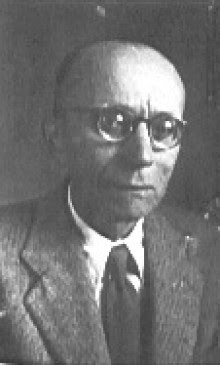Abraham Ben Yitzhak
Nacido Sonne, Galizia 1883 – Tel Aviv 1950. Fue un poeta israelí. En 1938 se radica en Tel Aviv, luego de la ocupación alemana de Viena. En 1950 muere a consecuencia de la tuberculosis. Sólo alcanzó a publicar once poemas en toda su vida, los cuales (junto a algunos otros, inéditos) fueron redescubiertos tras su muerte. Fue amigo de Elias Canetti, con quien se encontró en 1933. Canetti lo retrata como el doctor Sonne en sus libros autobigráficos, en los que aparece como un erudito interesado en la religión, la filosofía, la psicología y la sociología. Fue también amigo de James Joyce y de la poeta Leah Goldberg.
Avraham Ben-Yitzhak (Hebrew: אברהם בן יצחק; 1883 – 1950) was an Israeli Hebrew poet.
He was born Avraham Sonne, on September 13, 1883 in Przemyśl, Galicia, a region of Eastern Europe which has changed hands throughout history between Austria and Poland. In his youth, Przemyśl was part of the Austrian Empire, and he moved to Vienna to study. In 1938 he fled to the British Mandate of Palestine after the German occupation of Vienna. He died in 1950 in Israel of tuberculosis. He had only published eleven poems in his lifetime. These, and a few more, were rediscovered after his death.
He was a friend of Elias Canetti, who met him in 1933. Canetti describes "Dr. Sonne" in his autobiographical book Das Augenspiel (The Play of the Eyes). In his description, Avraham Ben-Yitzhak appears as a profound scholar with interests in religion, philosophy, psychology and sociology. Dr. Sonne had a lasting influence on Canetti, who later wrote a profile of him in the April 7, 1986 edition of The New Yorker. He was also a friend of James Joyce and rumored to be romantically attached to Leah Goldberg. Most of all, and especially in his later years, his friends remembered him for his long silences.
Felices los que siembran...
Felices los que siembran y no cosechan
pues se alejarán, errantes.
Feliz el generoso, el que da y derrama
su esplendor juvenil sobre la luz del disperso día
y en el cruce de caminos renuncia a sus tesoros.
Feliz del soberbio cuyo orgullo sobrepasa los límites del alma
y se transforma en la clara humildad
que sigue al arcoiris si atraviesa una nube.
Felices los que saben,
su corazón los llama desde el desierto
y en sus labios florecerá el mutismo.
Felices ellos pues serán sumados al latido del mundo,
vestirán la túnica de la desmemoria
y será con ellos sempiterno silencio.
Traducción: Gerardo Lewin
http://decantasion.blogspot.com.es/
A FEW SAY:
Day unto day bequeaths its fading sun,
and night after night laments for night.
Summer after summer is gathered in fall
and the world in its sorrow gives song.
Tomorrow we’ll die, the word in us gone.
We’ll stand before the gate at its closing,
as on our day of departure. And the heart rejoicing—
for God brought us near—will tremble in fear of betrayal.
Day unto day gives rise to a sun that burns,
and night after night pours forth its stars,
and poetry comes to a pause on the lips of a few:
on seven roads we depart and on one we return
Publisher: Tarshish (1952) 1968
© Translation: 2003, Ibis Editions
From: Avraham Ben Yitzhak, Collected Poems
BLESSED ARE THEY WHO SOW
AND DO NOT REAP...
Blessed are they who sow and do not reap —
they shall wander in extremity.
Blessed are the generous
whose glory in youth has enhanced the extravagant
brightness of days —
who shed their accoutrements at the crossroads.
Blessed are the proud whose pride overflows
the banks of their souls
to become the modesty of whiteness
in the wake of a rainbow’s ascent through a cloud.
Blessed are they who know
their hearts will cry out from the wilderness
and that quiet will blossom from their lips.
Blessed are these
for they will be gathered to the heart of the world,
wrapped in the mantle of oblivion
— their destiny’s offering unuttered to the end.
Publisher: Tarshish (1952) 1968
Translation: 2003, Ibis Editions
.
